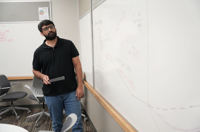The University of Kansas has found itself in the midst of a university space race, and it is one that the newly founded Jayhawk Rocket Propulsion Design club is determined to win.
Jayhawk Rocket Propulsion Design is a student organization founded back in August with the intent to make the University of Kansas the first university to launch a liquid fuel rocket into space.
The club will be going up against other teams from the University of Texas, California Polytechnic University Paloma, the Georgia Institute of Technology, Purdue University and many more. The teams from other colleges have a head start on the KU team, ranging from months to a few years, so the team will be working as efficiently as possible to catch up with its competitors.
The winner will be determined by whichever team manages to have its liquid-fuel rocket first cross the Kármán line. This is the line which sets the boundary between Earth’s atmosphere and outer space, and it is about 62 miles, or 100 kilometers, above sea level.
The club was co-founded by KU aerospace engineering Ph.D. candidate Brody Gatza and aerospace engineering master’s student Orion Roach.
According to Gatza, the club has begun work on its first rocket engine, Baby Jay, named after the University’s mascot. The rocket is planned to undergo a year of research and development with the goal of holding a fall 2025 hot-fire test, which is a test that ensures that all components work before attempting launch.
The space race began when Base 11, a nonprofit with the goal of increasing talent and representation in STEM (Science, Technology, Engineering, Mathematics) in the United States, kicked off the challenge in 2018 with cash prizes given to those who make the most progress. The goal was to push students to have a winning rocket cross the Kármán line by the end of 2021. However, COVID-19 killed this initial competition with Base 11 and its $1 million cash prize.
However, the race continued on and now FAR-Mars (Friends of Amateur Rocketry) are providing a $50,000 cash prize to the college that can complete the challenge first. However, while the club plans on competing to win the prize, it is not the main goal of the club, Gatza said.
For two and a half years, Gatza has been the project manager for KUbeSat, a KU organization made up of students collaborating with faculty to design and build small cube satellites, which are about the size of loaves of bread. He said that he built up experience in leadership and engineering through KUbeSat and that he wanted to build on the success of that organization, which successfully launched KU’s first satellite, KUbeSat-1 in July.
“Really, the ultimate goal is to make this as similar to what working in industry would be,” Gatza said. “To give students that experience before they graduate.”
To do this, Gatza and Roach have broken the club up into teams with specific missions that contribute to the project to mimic the set-up of real-world companies and to also offer students leadership opportunities.
Gatza and Roach’s methods have proven successful in maintaining interest as the club regularly has a returning group of 40-50 students per meeting, including third-year Ph.D. student Waleed Khan. Khan is the leader of the team in charge of designing the engine and has found enjoyment in many aspects of his role in the club.
“I have the chance to really, you know, go a step further than just research and really apply those things that I’ve learned. And yeah, one of the things that I really enjoy besides being able to do that is just helping the younger students learn because I just really like teaching,” Khan said.

Waleed Khan draws out a blueprint of his engine to show the Jayhawk Rocket Propulsion Design club at a club meeting in the KU School of Engineering on Oct. 17, 2024.
Gatza and Roach are hoping to further expand their team to include roles outside of engineering. Gatza said there are many roles that could be filled including people who could help with scheduling, media outreach, or even film the development of the rocket and document the club’s journey.
“I could see anyone working on this,” Gatza said. “We want passionate people.”
The club will also be launching a crowdfunding campaign. If students want to help support Jayhawk Rocket Propulsion Design’s mission, then they can contribute to their mission by donating. The campaign will begin on Monday, Oct. 28 and last through Friday, Dec. 13.
Jayhawk Rocket Propulsion Design is in the process of setting up its website, but those interested that have questions can reach out to ku.jrpd@gmail.com. The club meets twice a month as needed on Mondays from 5 p.m.- 6 p.m. in room LEEP2 2425 at the school of engineering. Its next meeting is scheduled for Nov. 4.

